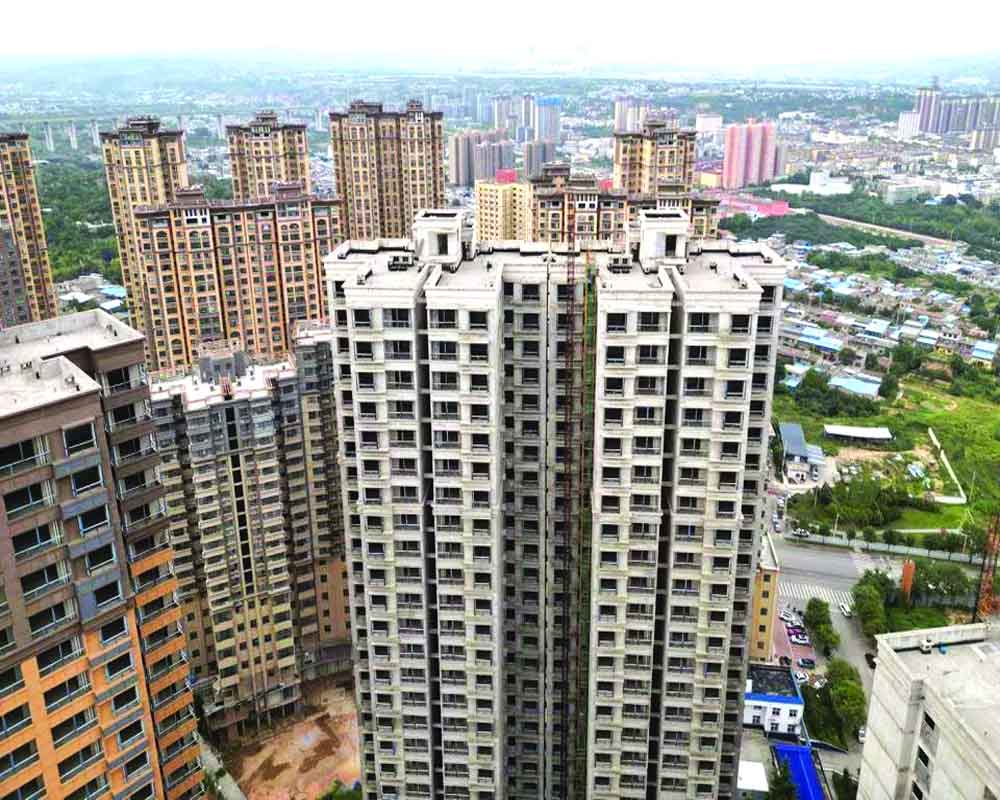The Chinese banks have depleted their resources by funding the construction of flats on an extensive scale, which have no buyers, resulting in a substantial financial strain
Over the years, there has been many whispers about many Chinese products for export being dumped. Importers often wondered: how else can they supply so many products so cheaply? But the greed for cheapness stopped them from stretching their whispers to leave alone protests, but even to gossip. Last their own governments woke up to ban such imports.
To the credit of the Chinese shrewdness, they did not under-price their export goods directly or in any way obviously. A cousin of mine visited the Yellow Kingdom to find out whether he could set up a shop in that country and profit. For a foreigner, he found, it was not so lucrative. All the money required to set up and run the business had to be taken from India. He could not borrow even a part of the working finance locally, not even from a foreign bank. An Indian bank had to remit the money to a local bank, which in turn could be used by my cousin. The minimum wage was not so low but certainly lower than the American or European levels. However, the total wages had to be paid to a government agency, which in turn, handed down a pittance to the workers. The rest stayed with the agency.
To a Chinese citizen, the facilities were much more favourable. The land for a factory was leased by the government at a nominal rent. The term loan was given at one or two per cent interest. If there were delays in repayment of the loan or the payment of rent, they were tolerated. But the beneficiary entrepreneur had to export 75 per cent of his production and earn hard currency foreign exchange. This was a must, whether the exporter made a profit or a loss. Perhaps this was the way of accumulating the dollars or the trillions of surpluses in foreign exchange. If necessary, yuans could be lost, but dollars had to be gathered. There is no doubt that this was an exchange of Chinese money for earning foreign exchange. The export prices were thus cut-throat in many an item. Whether this was tantamount to dumping or not is for economists to decide. If the prices were to be realistic, could not include the losses of Chinese capital as a result of the concessions given to citizen entrepreneurs? The exports were after all, below their costs of production.
If the Chinese government was unfair to the importer clients, it was equally unfair to their own country. After Deng Xiaoping came to power, it was decided to adopt a national strategy to go on a building spree. Build, build and build was the Chinese regime’s mantra, no matter whether required or not. It would give a boost of demand to the steel plants as well as to the cement industry. Apart from brick making and all other building requirements plus employment of skilled, semi-skilled and unskilled workers, the entire economy was to get an almighty boost.
In 2001, when our group visited China for a fortnight, we saw a great deal of building activity almost wherever we went. Streets were being laid, those already existing were being widened. The railings of parks were raised or were being replaced. Above all, on a 280 kilometre drive from Shanghai and back to visit a particular factory, we saw thousands of ten storeyed rows of residential flats. On the way back, in the dark, we noticed hardly any lights in these apartments, which indicated that these flats were not occupied. We realized that these flats had not been sold then.
The current crisis in the Chinese economy is probably caused by non-availability of loans to the potential buyers of the flats. This is serious; because a little over 20 per cent of China’s domestic assets are held in real estate, which probably is 30 per cent of China’s economy. The banks may have exhausted their funds by financing the construction of the flats and so many of them. A great deal of finance must have been sunk due to the great scale of building that has been carried. When we visited China, we were told that since the Maoist revolution of 1949, the government policy has been not to sell any asset to any individual or any private sector institution but lease the asset including farms to procedure which makes many a buyer in any country somewhat hesitant. A lease may be long, even for 99 years, but nevertheless still a taking-on-rent and is not tantamount to an ownership. After all, a lease can be cancelled or terminated. Where does the lessee stand? Most lay people would wonder?
If this be the problem, even if bank loans become available, disposal of the flats would face difficulties. The government can resort to deficit financing; to put it crudely, print more currency notes than hitherto. This resort runs the risk of causing inflation which carries its own public displeasure. In case, if leasing the obstacle, deficit financing would not be a solution. To half building would cause unemployment especially in steel and cement industries. Equally for the suppliers of other building materials, not speak of the large number of masons and unskilled workers.
China might possibly be tempted to sell the enormous number of US Treasury bonds to avail of a couple of trillion dollars. But this will only prompt other countries like Japan, South Korea, India and Germany to purchase them in the open market, while Beijing will only lose a precious leverage.
(The writer is a well-known columnist, an author and a former member of the Rajya Sabha. The views expressed are personal)


























